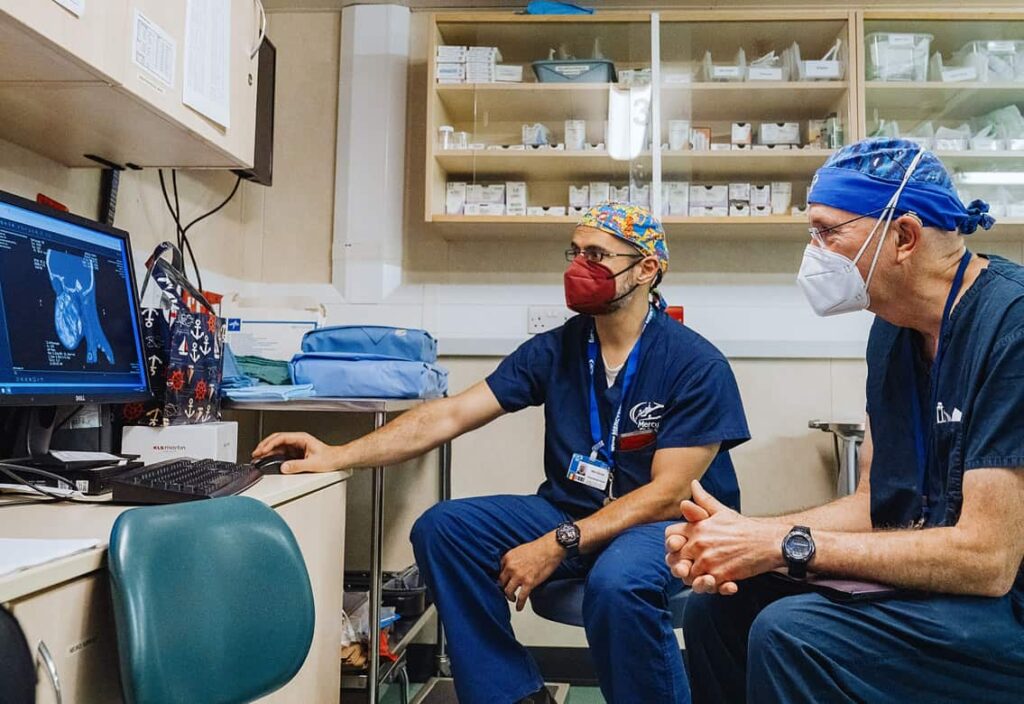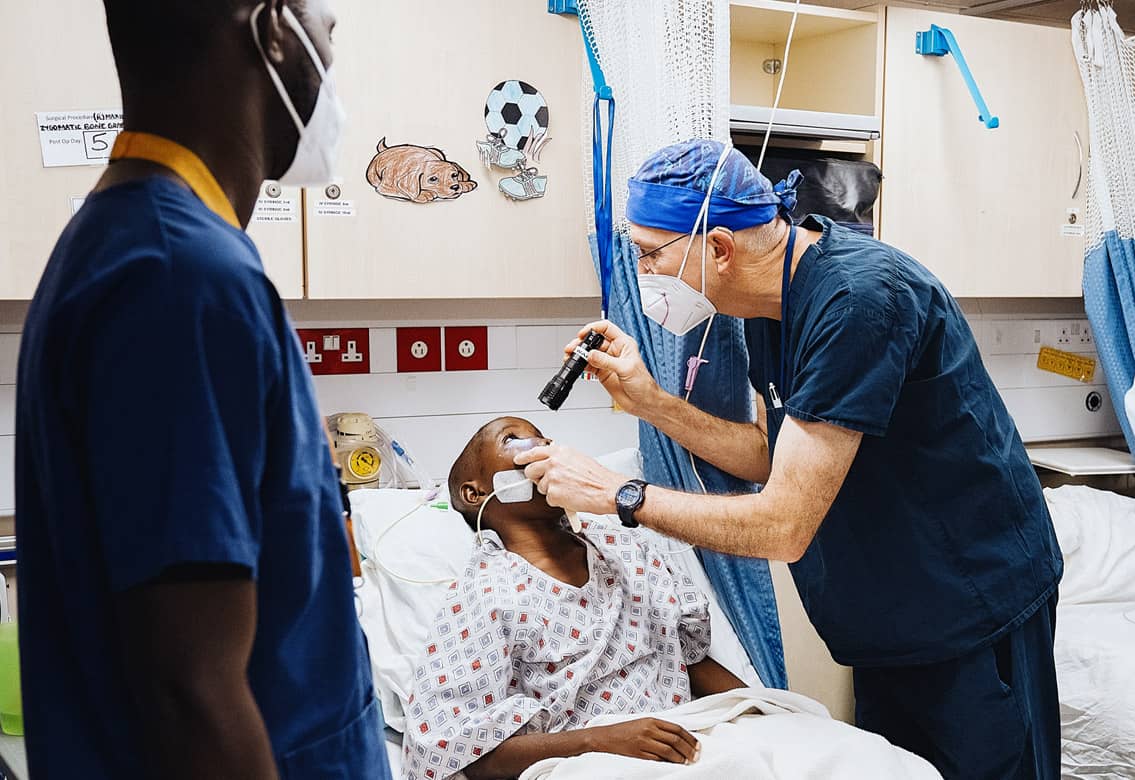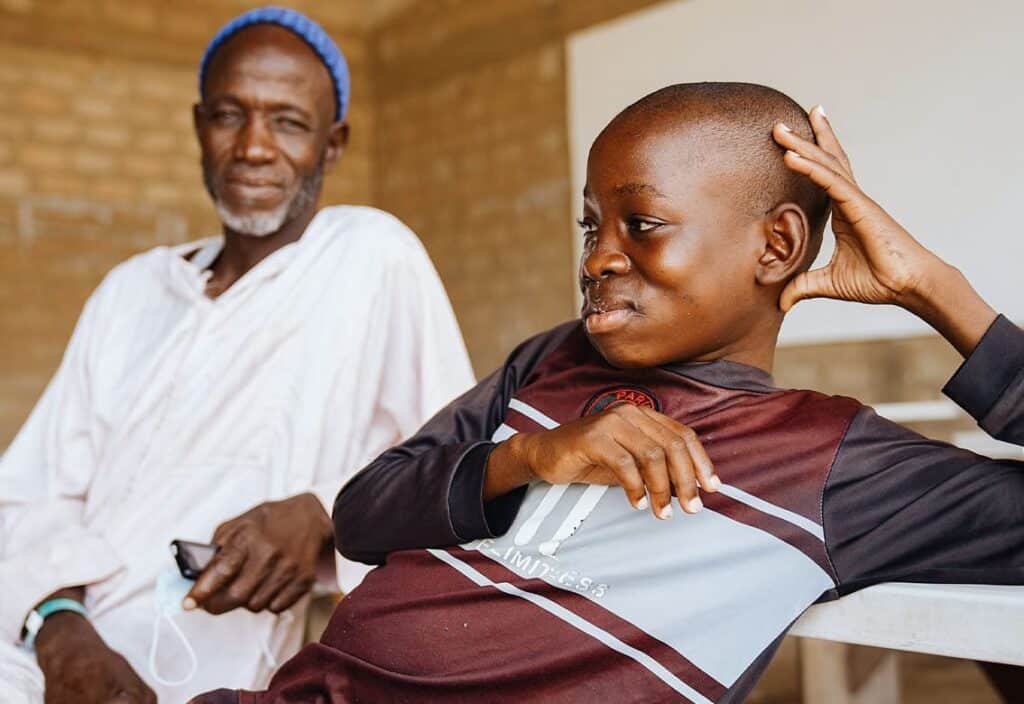Facial Tumor: The Road to Healing for Daouda
Father & Son
“There isn’t a single hospital in Dakar I haven’t been to, to try to get this treatment,” said 63-year-old Hamady on the Africa Mercy®, where his 13-year-old son Daouda finally received surgery for a facial tumor. The father and son had even left the country in search of healing: “We have been to Mali, to Burkina Faso—everywhere.”
Daouda had not even started school when a “tiny node” emerged in his upper jaw. Over the years, this painful tumor grew so large that it was hard for him to talk and eat. Daouda lost weight as he hit puberty. With Daouda struggling physically to eat, Hamady lost his own appetite.
“I would cry when I looked at my child. I became unable to eat. It was not right that I could eat well, but my child could not.”
For years, Daouda hid at home, leaving only when seeking treatment to remove his facial tumor with his father.
Going Everywhere for Surgery
Dr. Mark Shrime, the International Chief Medical Officer for Mercy Ships who would ultimately operate on Daouda, said, “Every hospital, every doctor told him they couldn’t do this.” Because of the late discovery of the node and the complicated nature of his case, which required a specific type of surgery, unfortunately none of the hospitals were able to provide the specialized help Daouda needed.
As Hamady was running out of options, he heard that the Africa Mercy would be offering free surgeries in Senegal. He knew bringing his son to the ship would be a challenge, particularly as it meant leaving during rainy season, a crucial time for his farm. However, encouraged by pictures of successful surgeries on Mercy Ships’ Facebook page, Hamady dropped everything:
“When I am not there, my heart is not calm, but when I see this disease also, it is not fine either. I must take him.”

The Long-Awaited Surgery
Before leaving for Mercy Ships, people in his village told him, “This is stupid. Don’t go. Nobody can cure this. They won’t be able to cure this either.” But Hamady persisted.
“When they sent us to the ship, that is when I started to breathe in peace,” he said.
Between the tumor removal, grafts, and facial reconstruction, hospital director Keren Fuhrmeister anticipated a “long and complicated surgery,” but Daouda emerged from the operating room in “half the time expected […] and miraculously didn’t need such extensive reconstruction, which will aid swifter recovery!”
Although Hamady was finally eating and sleeping well again, his instinct was still to fear the worst. After the surgery, nurses went to get him so that he could see his son in the post-anesthesia care unit:
“When they called me there, I thought he died. They said, ‘Come see your child’.” Hamady asked in disbelief, “It is over for him? He can speak? He has a mouth?”
Keren was there to see the reunion. “As he went in to see his son, I’ve never seen body language like it—the relief for a father who has never been able to get healing for his son. I don’t think I’ll ever forget the look he had. He went, and sat by his son, and held his hand, and his son was just waking up, and he just sat there with pure relief.” She concluded, “He just sat there, going, ‘I think maybe we’ve finally done it’.”

A New Life Ahead
“You’re a good father,” volunteer surgeon Dr. Gary Parker told Hamady during his morning rounds a week after performing the surgery with Dr. Shrime. Another week later, Daouda had healed so well that Dr. Parker discharged him from the hospital. Daouda said before leaving the ship:
“Personally, I thank you for what you have done for me. When I was at school, I was always the top of my class, but because of my condition, I had to stop in 2019.” But Hamady is hopeful that Daouda can return to the classroom. “I often encourage him. I tell him, ‘Go ahead. It is never too late. You will catch up. Because you are intelligent, you will catch up’.”
Daouda’s potential was apparent to all who met him. American pediatric intensive care nurse Erin Medeiros explained, “Daouda is super intelligent. He picks up on everything that is going on; he especially picks up on patterns.” Daouda even began to pick up more languages during his time on the ward. “He always wants something very stimulating to do […] and he just has this awareness about him. He is a bit of an old soul—in a little body.”

The Story of Daouda
The road to healing was a winding one for Daouda. Hamady hopes that the fruits of their labor will resonate on a national scale:
“Everybody on that road from my village to Dakar knows my child, and everybody’s going to see this, and know that he was cured.”
Hamady repeatedly called his family and friends back home to tell them the good news, but nobody believed him until he sent a picture. “That day, nobody went to sleep in our house. They were clapping their hands and celebrating.” Hamady admitted that he would not have believed the transformation himself if not for seeing it with his own eyes.
“Daouda’s story, how his father spent years trying to get care for his son, is why we do what we do,” said Dr. Shrime. “That’s the stuff that drives me.”
Hamady said after Daouda was discharged from the Africa Mercy, “Thank you. I will never forget this. Even if I die today, I will rest in peace. All of my children are in good health.”
To enable other patients like Daouda to have access to life-changing surgeries onboard a hospital ship, you can donate here or to discover other patient stories.
